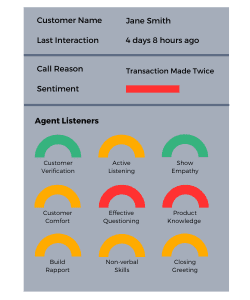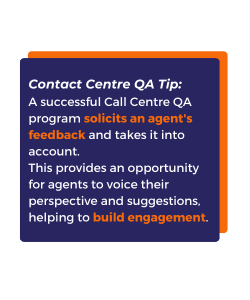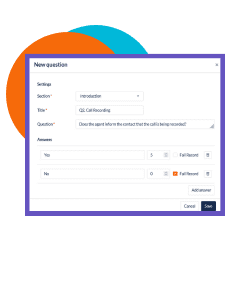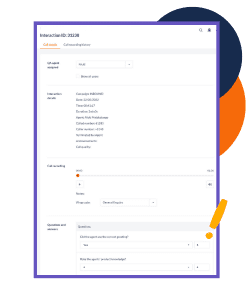Contact Centre Quality Assurance

Are you looking to improve customer satisfaction? Drive customer loyalty? Or drive efficiencies across your contact centre operations? Implementing an effective Quality Assurance program will assist your contact centre to achieve both of these objectives and unlock strategies to provide exceptional customer service.
A Quality Assurance (QA) program involves continuously measuring the effectiveness of a business’s contact centre department. Successful QA processes enable managers to constantly optimise frontline efforts to enhance the customer experience while also committing to monitoring, evaluating and improving an agent’s performance.
This article will explore how the contact centre Quality Assurance is paramount to an organisation’s success and delve into the key strategies that can help you set up and maintain an effective QA process.
Contact Centre Quality Assurance importance
In a call centre, conducting Quality Assurance is vital to pinpoint customer issues that occur over the phone. Identifying call centre quality issues while simultaneously recognising agent improvement areas, enables managers to create tailored strategies to improve the service delivered. This approach can lead to better meeting customer needs and refining agent performance.
Call centre quality assurance plays a major role across the entire operations of a contact centre which includes:
Setting Clear Expectations: QA scorecards determine quality standards and provide agents with insights into how to deliver an optimal customer experience.
Ensuring Compliance: depending on the customer enquiry, agents can be required to adhere to stringent regulations. Completing call monitoring as part of the quality assurance program is an effective way to surface non-compliance where contact centre managers can perform corrective action activities to ensure compliance is met.
Identifying Agent Improvement Areas: Evaluating agent performance based on a customer interaction score allows managers to conduct tailored agent training sessions which can help improve agent outputs.
Differences between quality control (QC) and quality assurance (QA)
Quality Assurance and Quality Control are two elements of a business’s quality management system. Quality Assurance focuses on a business’s output – in this case, a call centre agent’s performance – and evaluates the customer interaction based on pre-determined criteria that is known as a ‘Quality Assurance scorecard’.
In contrast, Quality Control occurs once the Quality Assurance process is completed and focuses on carrying out corrective action. For example, if the QA scorecard reflects the agent did not meet their key performance indicators (KPIs), quality control procedures will correct the agent’s behaviour to ensure the relevant objectives are met.
Contact centre quality assurance – Types
Businesses can perform quality assurance programs in two different ways, which are:
Automated (unsampled) contact centre QA using AI
To run a successful call centre, many call centres leverage AI customer service technology such as Speech Analytics to automate their QA program for operational efficiencies. Speech Analytics software enables managers to train AI listeners with the scorecard criteria, and measure phone calls against these metrics. This type of QA software not only saves staff valuable time by removing the need to listen to the entire duration of a call recording but also ensures every customer interaction is reviewed and eveluated. Automating QA allows businesses to consistently measure agent performance and track metrics such as script compliance, sentiment, emotion and more to uncover critical customer experience findings. In doing so, team leaders obtain complete visibility of an agent’s performance and can leverage the QA results to deliver feedback and conduct tailored coaching sessions to optimise output.
Furthermore, AI is being used for live QA. AI Customer Service tools such as visual QA scorecards that update based on the transcription of the call can provide live feedback to agents as they engage:

Manual call centre QA with sampling
If your call centre’s QA program is carried out manually, it is almost impossible to monitor, assess and evaluate every single customer interaction. QA specialists will instead use a sample of a customer service representative’s interactions, meaning the QA process applies to a limited number of conversations. To ensure the maximum findings are drawn from a sample, team leaders may decide to solicit feedback from agents or implement measures of performance management to ensure each service representative is meeting quality standards. However, manual call centre QA opens the risk for missing or overlooking customer interactions that may require necessary coaching sessions to rectify agent behaviour and improve how your organisation service customers.
How is Call Quality Assessed?
Call quality is measured through a pre-determined framework which can incorporate call and customer metrics. This framework is used by QA teams to measure the effectiveness of interactions between an agent and a customer. Call quality can be assessed through:
Call and customer metrics:
Every call centre quality assurance program tracks different customer metrics that are based on the service the business delivers. Common call quality metrics that are assessed include:
Time to Serve: This metric indicates the time it takes for a call centre agent to answer a customer’s enquiry over the phone.
Average Handling Time (AHT): This is the average duration it takes for an agent to handle an interaction which incorporates talking time and post-call work.
Call Transfer Rate: The frequency of calls that need to be transferred to another agent or a different department to resolve the customer’s enquiry.
Customer satisfaction (CSAT): Typically collected from a post-call survey, CSAT measures how satisfied the customer is feeling after the service they received.
Net Promotor Score (NPS): This metric gauges how likely a customer is to recommend the company’s product or services to other people.
QA assessment:
Establishing a Quality Assurance assessment is the very first step you need to determine how the business will monitor, assess and evaluate customer interactions. After a series of customer conversations have been monitored by a QA specialist, a QA assessment is produced in the format of a scorecard. A QA scorecard incorporates the most relevant call and customer metrics and is used by QA specialists to measure the quality of subsequent interactions.
Ensuring customer satisfaction
When overseeing the operations and outcomes of a contact centre, it is essential to measure customer satisfaction across Quality Assurance processes. A QA process to assess customer interactions enables contact centre managers to conduct a root cause analysis to uncover best practices for customer experience. They can measure and track the the tone of voice, rapport, empathy, effective questions, relationship building exercises and more. Using this knowledge, managers can create guidelines for agents to follow in the pursuit of consistently improving customer satisfaction.
Steps to boost agent performance in contact centres
An effective quality assurance program not only highlights customer issues with the brand, but also offers continuous opportunities for call centre agents to improve their performance and deliver high quality service. The following steps can be implemented to boost agent performance across the operations of a contact centre:
Set Goals
One way managers can motivate agents to improve their own performance is to set attainable goals for indovidual agents. Quality assurance analysts assess an agent’s areas for improvement by evaluating their performance through the QA scorecard. QA analysts can share findings from the QA scorecard with team who are in turn able to provide feedback to agents. Setting goals can also stimulate a newfound drive to achieve success for the individual and team, which can positively affect the customer service delivered.
Develop Comprehensive Scorecards
A comprehensive scorecard provides agents with a set of clear objectives and expectations as well as ensures QA analysts assess customer interactions beyond ‘ticking a box’. Comprehensive scorecards surface which areas agents can improve on and assists managers in delivering targeted coaching sessions. Managers can develop a comprehensive scorecard through structuring the criteria into different categories such as:
- Adherence to internal policies and practices such as announcing the company greeting message.
- Meeting compliance with external regulations
- Integrating Call Metrics by setting a standard to achieve time to serve under 10 seconds
- Incorporating quality customer expectations
Building a comprehensive scorecard makes it easier to align your customer service team objectives with your customer expectations and promotes an accessible way for agents to independently examine their performance and improve their output.
Engage Agents in the Quality Assurance process
Businesses that have already set up a Quality Assurance program can engage with agents through by including them in calibration sessions. To consistently improve the QA program, agents can be encouraged to submit an evaluation form to gather feedback.

Coach and develop
A good quality assurance system will also uncover opportunities and areas to provide coaching to agents. Training could be completed to help them provide more technical support, manage conflict or strategies to shapre a positive customer experience. Moreover, providing regular training sessions can incrementally improve the overall team performance and lift the quality of service delivered.
Reward and encourage agents for good performance
It is important call centre agents are recognised for their achievements to foster a sense of pride in their efforts and inspire future success. Contact centre managers reward, encourage and incentivise agents through:
Preferential scheduling – granting your top-performers the chance to have a say or influence in their preferred work shifts can drive motivation to consistently deliver a high level of quality service.
Monetary bonuses – a bonus can be set up in different intervals – weekly, fortnightly monthly, annually – which not only rewards performance, but also can stimulate further excellent performance and in the long-run, improve staff retention.
Training opportunities – offering training courses for agents to participate in can encourage agents to enhance their existing knowledge and learn the latest customer experience best practices. These acquired skills will funnel into their interactions with customers, contributing to the ongoing of improvement of service quality.
Contact centre award system – signify and reward good performance through setting up an award system. Recognising a call centre agent in front of their team members can boost morale and motivate others to succeed.
To help reduce customer churn, elevate brand loyalty and improve customer retention, a successful call centre quality assurance program will feed crucial findings to contact centre managers. This facilitates management to reward agents, develop their skillsets, promote agent engagement and set clear key performance indicators that are reflected within the scorecard.
Contact Centre quality assurance tool benefits
ipSCAPE’s multi-channel cloud contact centre solution has a sophisticated in-built quality assurance module that enables managers conduct quality monitoring.
Using ipSCAPE’s contact centre quality assurance framework, supervisors can intuitively construct a scorecard:

When reviewing calls between an agent and a customer, QA analysts are equipped with all relevant interaction details and are able to easily monitor and evaluate the interaction:

Quality Assurance supervisors are able to export the data so results can be shared with the wider business. This enables contact centre managers to gather insights into the customer experience and create strategies to consistently enhance agent performance.
Quality Assurance is an integral part of running a successful call centre. If you’d like to discover how ipSCAPE’s contact centre solution can uplift and strengthen your quality assurance processes, enabling you to gain actionable insights into the customer experience and agent performance, contact us to find out how ipSCAPE’s award-winning software can help your contact centre operate more effectively.
ipSCAPE is a feature-rich, scalable cloud communication technology solution with advanced integration capabilities. We help businesses connect with their customers through multi-channel communications, including Voice, Web Chat, Email, SMS, IVR, and other emerging channels.